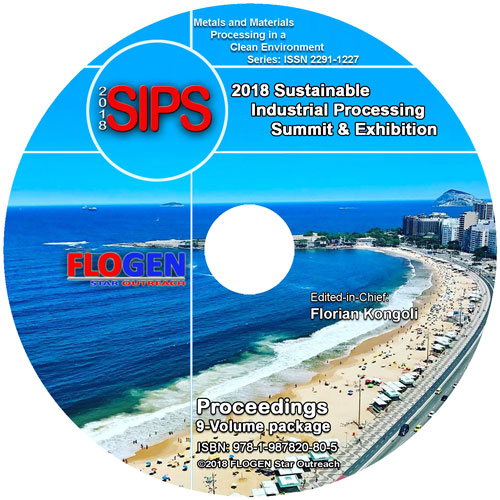2018-Sustainable Industrial Processing Summit
SIPS2018 Volume 7. Non-ferrous / Mineral Processing / Environmental Protection
| Editors: | F. Kongoli, Z. Wang, T. Okura, E. Souza, A. C. Silva |
| Publisher: | Flogen Star OUTREACH |
| Publication date: | 23 December 2018 |
| Pages: | 256 pages |
| ISBN: | 978-1-987820-94-2 |
| ISSN: | 2291-1227 (Metals and Materials Processing in a Clean Environment Series) |

CD shopping page
Biobased Aromatics – Challenges, Hurdles, and Opportunities
Ludo Diels1;1VITO/UA, Mol, Belgium;
Type of Paper: Plenary
Id Paper: 313
Topic: 10
Abstract:
Aromatics are among the most important resources for the chemical industry. Many materials are made from aromatics and lead to higher or better performance. Brand owners are on the search for more sustainable molecules (e.g. bio-based). But also the introduction of higher performance and safety issues can be seen as the most important driver for this development.
Currently virtually all aromatic building blocks are made from fossil oil. This presentation is anticipating the expected growing shortage of aromatics from the petrochemical industry and the widely shared ambition to green the chemical industry. On top of that one of the main drivers is to develop innovative molecules that are safer and more performing.
This lecture will give an overview of the problems linked to wood-based refineries and the availability of lignin sources. Next, it will give an overview of the different approaches worldwide to valorize lignin and to produce bio-based aromatic molecules. It will indicate the hurdles, challenges and needs for value chain approaches.
A nice example in integrated approach is the The Shared Research Center, Biorizon. Biorizon, an initiative of TNO, ECN, VITO and the Green Chemistry Campus, develops technologies to produce aromatics derived from plant-based (waste) streams. Biorizon brings together global leaders (large industry and SMEs) in the fields of feedstock, conversion, equipment, building blocks, materials and end-products. Biorizon aims to be a world leader in the development of biobased aromatics to provide the chemical megacluster around the Netherlands, Flanders (Belgium) and Nordrhein Westfalia (Germany) with innovative, sustainable building blocks leading to many different applications in the products marketed by brand owners and small companies. The objective is to make commercial production feasible for industrial partners by 2025 at the latest.
Biorizon utilizes plant-based streams such as wood or its fractions lignin and sugars to develop functionalized biobased aromatics for performance materials, chemicals & coatings.
Biorizon is based on the open innovation methodology, bringing together collective intelligence of various industries, companies and knowledge organizations. The multi-disciplined technological need, as well as the long term roadmaps based on thermochemical conversion, sugar chemistry for furanes and lignin depolymerisation-based chemicals for functionalized aromatics lead to a large network of applied research projects with more than 40 industrial partners, sharing research, intelligence, investments, risks and workload in different projects.